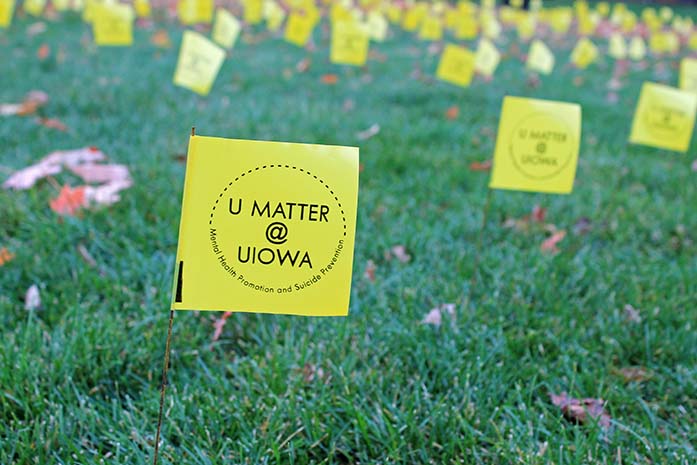Opinion | Students need preventative mental health resources
Implementing crisis services is essential in addressing students mental health, but there needs to be more long-term preventative resources.
The Active Minds at University of Iowa Counseling Services hosts the Field of Memories in the Pentacrest on Wednesday, Oct. 28, 2015. Students are asked to sign each flag, which represent the number of students who kill themselves each year, with an encouraging message to show that they care.
October 19, 2021
It’s important to have crisis mental health resources. However, the University of Iowa needs to invest more in preventative services such as therapy.
The Division of Student Life recently announced a new partnership with CommUnity Crisis services to provide a 24-hour, seven days a week crisis hotline, funded by the Division of Student Life and students’ tuition.
When people call the crisis line, they are given several different options. Students can be talked through their situation with one of the crisis counselors, and may be directed to in-person support options to address their needs based on the situation.
The crisis line was a good initiative to help address mental health for students at the university, but there needs to be more therapy and counseling options.
There is a clear need for more mental health services for college students. Nationally, a survey of incoming or enrolling college students showed 44.1 percent of students expected to encounter mental health issues themselves or from people around them. Further, 52.8 percent of students reported that getting ready for this semester was more stressful than in fall 2020.
Statistics have come out about the mental health of students at the UI. The third most significant academic impediment for students was anxiety, with 37.4 percent of students reporting it as a problem, and 28 percent reporting depression.
It has become clear not only from statistics but also from real-life experiences that students need more support. Last week in one of my classes, my professor asked how students were handling things this year. We spent the entire hour-and-a-half listening and participating in a discussion about students’ mental health and overall health concerns.
Many students expressed how they no longer have time to sleep or sometimes go all day without eating, and many shared they don’t feel like they can prioritize their mental health and take days off.
There have been several announcements addressing mental health on campus and opportunities to get help so far this year. However, these initiatives do not seem to address long-lasting prevention.
An announcement earlier this month from University Counseling Services included new information about handling stressors during COVID-19, which has contributed to the increased need for these services. One study found 71 percent of students felt increased anxiety and stress from the pandemic. While compiling resources the university offers is helpful, counseling and therapy services need to expand.
Students generally get three to eight free counseling sessions. Unfortunately, this number of sessions is not enough for students to fully address their mental health needs.
Shayna Ungerleider is an undergraduate student studying psychology.
“I had three sessions then requested a new therapist, but by the time this situation played out, I didn’t want to continue,” Ungerleider said.
University counseling services are an essential service that should be invested in and maintained. However, this is an area that the university should expand on.
As lovely as it is seeing the signs saying “You belong Here” approaching the English Philosophy Building, it would be more comforting to see students able to consistently address their mental health concerns.
The crisis hotline is a necessary service, but we should care about the long-term health of students and invest in therapy, services that address social challenges, and systems where students don’t have to push their mental health to the side to achieve in school.
Columns reflect the opinions of the authors and are not necessarily those of the Editorial Board, The Daily Iowan, or other organizations in which the author may be involved.




